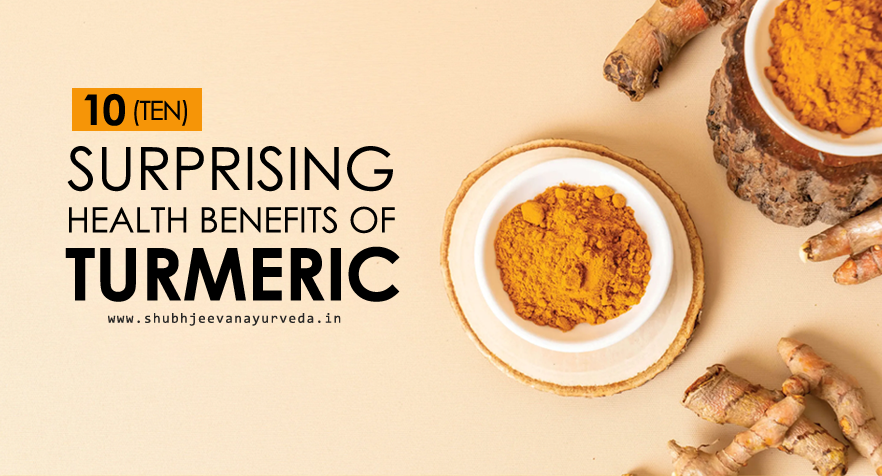- Your cart is empty
- Continue Shopping
Surprising Health Benefits Of Turmeric (हल्दी) That You Should Know

Overview : Turmeric is a spice that comes from the turmeric plant. It is commonly used in food as well as turmeric root is also used to make medicine. Turmeric Contains Bioactive Compounds With Powerful Medicinal Properties. Turmeric has been used by Ayurvedic healers as medicine since olden days. Popularly known as haldi, this powerful spice is also a go-to option while dealing with numerous health ailments. It contains a yellow colored chemical called curcumin, which is often used to color foods and cosmetics.
10 Surprising Health Benefits of Turmeric (Haldi)
“Turmeric is a powerful herb with over 300 nutrients including beta-carotene, ascorbic acid (vitamin C), calcium, flavonoids, fibre, iron, niacin, potassium, zinc among others. But the active compound which has caught the attention of scientists, supplement industries and food technologists is curcumin for its anti-inflammatory and anti-bacterial properties.”
1). Anti-Inflammatory :-
One of turmeric’s main claims to fame is that it’s commonly used to fight inflammation, and the bulk of turmeric’s inflammation-fighting powers can be credited to curcumin. In fact, in the right dose, curcumin may be a more effective anti-inflammatory treatment than common inflammation-fighting medications such as Advil (ibuprofen) and aspirin, according to a past study. As chronic inflammation contributes to many chronic diseases, curcumin may help treat conditions like inflammatory bowel disease, pancreatitis, and arthritis.
2). Powerful Antioxidant :-
Curcumin has been shown to be a strong scavenger of oxygen free radicals, which are chemically active molecules that damage body cells. Inflammation, as well as free radical damage, is a major driver of heart disease, so curcumin may play a role in preventing and managing heart disease. Antioxidants in turmeric can also reduce the risk of cataracts, cataracts and macular degeneration.
3.) Anti-Cancer Effects :-
Many animal studies have detected the effect of turmeric on cancer, and many have found that it can affect the formation, growth and development of cancer at the molecular level. Research has shown that it can reduce the spread of cancer and contribute to the death of cancer cells. Turmeric and curcumin may also be able to counter the effects of certain carcinogens, such as some additives used in processed food.
4.) Immunity Booster & Viral Protection :-
Turmeric also boosts the immunity levels. Its anti-bacterial, anti-viral, and anti-fungal properties protect us from a variety of infections. Many doctors highly recommend taking a teaspoon full of Turmeric in a glass of warm milk every day to keep common cold and flu at bay. The next time you’re under the weather, you may want to sip some turmeric tea. Curcumin might help you to fight off a variety of viruses, including herpes and the flu. (But most of the research on this was done in a lab, not on people.) Keep in mind that turmeric is only about 3% curcumin, and your body doesn’t absorb curcumin well, so the occasional cup of tea won’t be a cure-all.
5.) Heart Diseases :-
The antioxidant property of curcumin found in turmeric may prevent heart diseases and diabetic cardiovascular complications. Curcumin also reduces serum cholesterol levels and protects against the pathological changes occurring with atherosclerosis.
6.) Improve Skin Health :-
Turmeric may be an effective treatment for a variety of skin conditions, including acne, eczema (atopic dermatitis), photoaging, and psoriasis. According to a study, turmeric has been Seen to help reduce the symptoms of skin conditions like psoriasis and eczema. Some people claim that putting a turmeric mask on their skin or eating turmeric will help fight stubborn pimples — perhaps because of the spice’s reported antibacterial and anti-inflammatory properties.
7.) Depression :-
Several compounds in turmeric may support your health. The most well-known of these is curcumin. Scientists are excited about curcumin’s potential to ease depression and help antidepressants work better. But so far, research results have been mixed.
8.) Diabetes :-
Curcumin present in turmeric delays the onset of type 2 diabetes by inhibiting the formation of inflammatory cytokines and thus having a favourable effect on blood glucose levels. Because curcumin can help fight inflammation and keep blood sugar levels steady, it could be a useful tool to prevent or treat type 2 diabetes. One study followed 240 adults with prediabetes and found that taking a curcumin supplement over 9 months lowered their odds of developing diabetes. Research is ongoing, but a lot of the studies so far have been on animals, not people.
9.) Arthritis & Joint Pain :-
Turmeric has shown promise for its ability to ease joint pain, stiffness, and inflammation. However, we need more research before turmeric becomes a go-to arthritis treatment. If you decide to try it for your joint pain, help your body absorb natural curcumin by eating your turmeric along with black pepper.
10.) Improves Digestion :-
Curcumin in turmeric reduces bloating and brings the digestive system on track. It stimulates the gallbladder to produce bile. It also helps in preventing and treating pancreatitis.
: Some Side Effects of Consuming Turmeric :
- Higher dosage of curcumin leads to acid reflux, diarrhoea, dizziness and headaches
- Turmeric might slow blood clotting. This might increase the risk of bruising and bleeding in people with bleeding disorders
- Turmeric might make stomach problems such as GERD worse
- Turmeric can make blood sugar too low in patients with diabetes

